
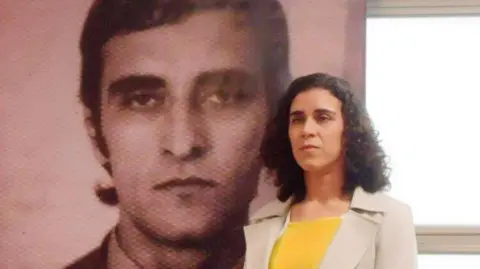 Tessa Mora Lacerda
Tessa Mora Lacerda“Did we really do it?” Tessa Moura Lacerda asked her in disbelief as they stood outside a government office on a rainy morning in August 2019. mother.
In their hands was a document they had fought for years – her father’s death certificate, which now correctly stated the cause of his death.
It reads: “During the dictatorship established in 1964, the state inflicted unnatural and violent deaths on missing persons (…)”.
Tessa’s father, Gildo Macedo Lacerda, died under torture in 1973 at the age of 24, during the most brutal period of Brazil’s military dictatorship.
The National Truth Commission found that over two decades, at least 434 people had been killed or disappeared, and thousands more had been detained and tortured.
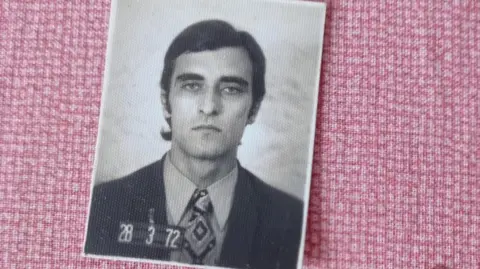 Tessa Mora Lacerda/Family Handout
Tessa Mora Lacerda/Family HandoutOn October 22, 1973, Gildo and Tessa’s mother Mariluz, who was pregnant with Tessa at the time, were arrested in Salvador, Bahia, where they lived fearing persecution.
They are part of a left-wing group that demands democracy and seeks to overthrow military rule.
The authoritarian regime targets opposition politicians, trade union leaders, students, journalists and virtually anyone with political dissent.
Mary Luce was released after being interrogated and tortured, but Gildo disappeared.
He is believed to have died at a military installation in nearby Pernambuco state six days after his arrest.
Former detainees told the truth commission that they saw Gildo in prison and were led into an interrogation room where they could hear screams that kept them awake at night.
The committee also found documents documenting his arrest.
But newspaper reports at the time said he was shot dead in the street over a disagreement with another member of the political group.
The government frequently planted false narratives in newspapers read by large audiences in Brazil and internationally.
Gildo’s original death certificate was issued after a 1995 law allowed families of missing persons to request documents, but the cause of his death was blank.
His remains are believed to have been buried in a mass grave with those of other political dissidents, but have never been identified.
“Like I remember his fear”
Tessa, who never met Gildo, said her father’s death was a constant presence in her life.
Growing up, her mother gradually told her more and more about him, until she was old enough to learn the brutal details of his death.
But the lack of official recognition and the fact that the family never buried him had a profound impact on her.
“His absence, his physical absence, has created its own set of problems,” Tessa told BBC News.
“As a child, I thought he might not be dead. I had this fantasy that he managed to escape, and I’m not sure if my mother knew that.”
Now, as an adult, she says she still feels like there’s something “broken” inside her.
Over the years, she suffered nightmares and couldn’t sleep in the dark, and when she became a mother, she suffered panic attacks worried about what would happen to her children.
“It’s like I have a physical memory of this fear,” she said.
“People may think it’s weird, like it’s something supernatural, but it’s not.
“This is trauma. I was born with it.”
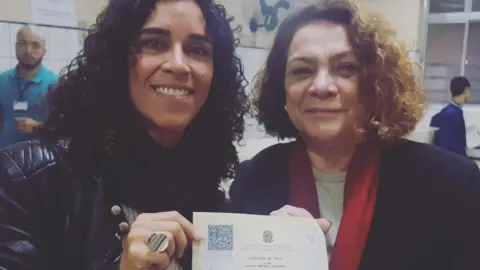 Tessa Mora Lacerda/Family Handout
Tessa Mora Lacerda/Family HandoutUntil she was 18, Tessa’s own birth certificate did not list Gildo as her father, and the family had to fight a lengthy legal battle to prove that Gildo was her father.
This made correcting her father’s death certificate an even more important task.
“It’s part of my job,” she said.
“This is not just in memory of my father, but also in memory of all those who disappeared, were killed or were tortured during the dictatorship.”
In December, Brazil announced it would correct the certificates of all confirmed victims to acknowledge the state’s role in their deaths.
So far, only a few families like Tessa have been able to cooperate with a special commission, which was disbanded by then-President Jair Bolsonaro in 2022 and replaced by President Luis I in 2024. Nacio Lula da Silva reinstated to ensure their certificates were revised.
“This is a legal reckoning with the past,” said Luis Roberto Barroso, president of Brazil’s Supreme Court.
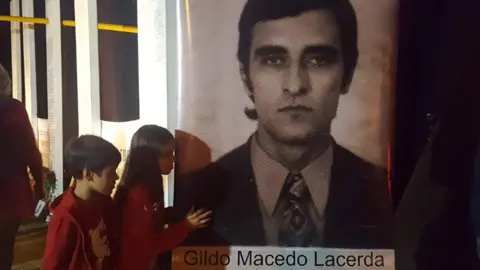 Tessa Mora Lacerda/Family Handout
Tessa Mora Lacerda/Family HandoutIn recent weeks, a new film from BAFTA-winning director Walter Salles has brought the realities of the dictatorship to the surface, sparking a national discussion about this violent history. .
“I’m Still Here” is adapted from Marcelo Rubens Paiva’s novel of the same name. It tells the story of the author’s mother, Eunice, who struggles to survive after the torture and murder of her father, former congressman Rubens Paiva. A story of struggle for justice.
Eunice waited for 25 years for her husband’s death certificate.
Without it, she lost access to her family’s bank account and had to rebuild her life.
She died in 2018 without knowing what exactly happened to her husband in his final hours and unable to bury him.
Fernanda Torres plays Eunice in the film, Won the Best Actress Award at Brazil’s first Golden Globe Awards last week Thanks to her performance in the film – many are hoping to see her on the Academy Awards nomination list later this month.
She told BBC News she greatly admired Younis.
“She was a woman who never took a second to seek validation for herself… She wanted validation for her husband’s death.
“While the world has changed, this absence has never been healed,” she added.
“How do you tell these families: ‘Forget it. Just brush your dead under the rug?'”
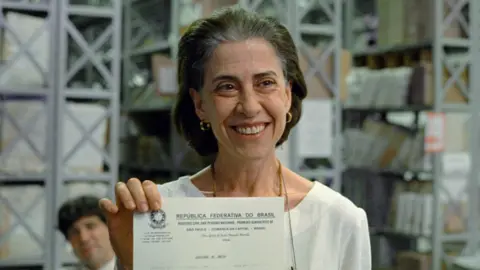 altitude movie
altitude movieAlthough “I’m Still Here” is primarily set during the dictatorship, it resonates deeply with Brazilians today.
Brazil is a deeply divided country, and its politics have become extremely polarized.
Extreme rhetoric and efforts to rewrite the narrative of authoritarian regimes have increased in recent years.
In 2016, a group of protesters stormed Congress Calls for the restoration of military rule. Three years later, Bolsonaro became education minister Order to revise history textbooksdenying that the overthrow of the democratic government in 1964 was a coup.
Bolsonaro is a former army captain Praising the former dictatorship and hosting events to commemorate the coup during his tenure.
Recently, Bolsonaro and some of his closest allies Officially accused of plotting a coup After he loses the 2022 presidential election.
The former president never publicly acknowledged his defeat and his supporters refused to accept the results, Attacks on Congress, the Presidential Palace and the Supreme Court on January 8, 2023.
Salles told the BBC that the current political situation in Brazil was part of the reason why now was the perfect time to make the film.
“The remarkable thing about literature, music, film and art is that they are tools against forgetting,” he said.
‘This trauma is collective’
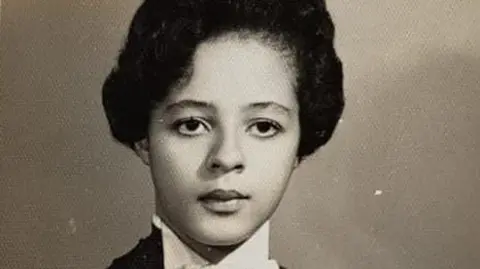 Marta Costa/Family Handout
Marta Costa/Family HandoutBrazilians close to the story said they left the cinema in tears after watching the film.
Marta Costta, whose aunt Helenira was killed in 1972, said she wanted to withdraw from the screening.
“You imagine your family being masked and tortured in this way,” she told BBC News.
“When Eunice tells her story, she tells my story; when I tell my aunt’s story, I tell their story. You can’t separate one from the other,” she said.
Marta is making a documentary about Helena and her years of resistance, but her family remains in the dark about her disappearance and death. Helenira’s body was never found.
“It’s a cursed legacy because we have to pass the baton from generation to generation until we can ensure her memory is preserved and history can tell the story of how it happened.”
Fifty-two years after Helena was killed, her family will receive a certificate acknowledging the harsh reality of her death.
Its importance, Marta said, is immeasurable.
“The day we received the certificate, it was as if the state acknowledged its role and apologized.
“This is the first step toward being able to start over.”
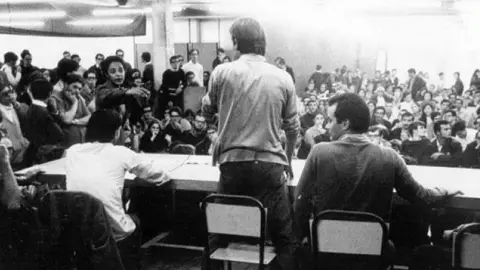 Marta Costa/Family Handout
Marta Costa/Family HandoutWhile the certificates are a step forward, both Tessa and Marta said the families still have a long way to go in their fight for justice.
The amnesty law that remains in effect means that neither military officials in power at the time nor those accused of torture and killings have been prosecuted. Many people have died.
There has been no formal apology from the government or military.
“Brazilian society needs to recognize this history so these deaths are not in vain,” Tessa said.
“If we don’t work to clarify this history and acknowledge our pain, we will always be at risk of something like this happening again,” Marta said.
In Tessa’s words, the trauma of the dictatorship is the trauma of the nation.
But for her, like Marta and Eunice, it’s also a deeply personal history.
“I will never stop fighting until the end of my life,” she said.
“I will bury my father.”
I’m Still Here will be released in UK cinemas on February 21, 2025









